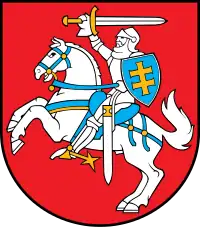Liberal Union of Lithuania
The Liberal Union of Lithuania (Lithuanian: Lietuvos liberalų sąjunga (LLS)) was a liberal[1] political party in Lithuania.[2][3]
 |
|---|
| This article is part of a series on the politics and government of Lithuania |
History
The party was founded on the 25th of November, 1990 on a basis of the Vilnius University Liberal Club. Its first leader was Vilnius University philosophy professor Vytautas Radžvilas. In 1992 parliamentary election, the Liberal Union got 1.51 per cent of votes and failed to win any seats. On January 1993 the party congress agreed upon declaration, which stated that the party would right-wing one. In 1994 the party's membership grew. Most of these new members were either former politicians (e. g. former Moderates Movement's leader Eugenijus Gentvilas) or employees of company EBSW.
In 1995 municipal election, the party got 2.69 per cent of the votes nationally and 40 councillors. Most of these gains were city districts (e. g. Birštonas, Marijampolė, Klaipėda).[4] After these elections many members of Liberal Union in Kaunas resigned. In 1996 parliamentary election the party got one mandate. In 1997 municipal election, the party won 3.99 per cent of the votes. As a result, the Liberal Union managed to form coalitions with other parties and win mayorships (most notably, in Klaipėda).
Party's breakthrouh came in late 1999, when former Prime Minister of Lithuania (and Homeland Union member) Rolandas Paksas became party's leader. In 2000 municipal election the Liberal Union won 13.99 per cent of the votes (first place was won by the New Union (Social Liberals) with 16.68 per cent of the votes) and mayorships in three major cities, Vilnius, Kaunas and Klaipėda. In the parliamentary election of the same year, the party won 17.25 per cent of the votes and 34 seats in Seimas. By this, the Liberal Union was the largest single party in Seimas for four months in 2000 and 2001.
After these elections, the Liberal Union formed a coalition with the New Union (Social Liberals), the Lithuanian Centre Union, the Modern Christian Democrats and the Electoral Action of Poles in Lithuania (with support from the Lithuanian Peasants Party). This coalition lasted for seven months, when New Union (Social Liberals) withdraw their government ministers. After this, the party became opposition one. By December, 2001 Rolandas Paksas (and some of his followers) left the Liberal Union and found the Liberal Democratic Party. Along this split, the party started negotiations with former coalition partners, the Lithuanian Centre Union and the Modern Christian Democrats, about merger. All three parties merged into Liberal and Centre Union in 2003.
Prominent members
See also
- Liberalism
- Contributions to liberal theory
- Liberalism worldwide
- List of liberal parties
- Liberal democracy
- Liberalism in Lithuania
External links
References
- Nordsieck, Wolfram. "Lithuania". Parties and Elections in Europe. Archived from the original on 4 August 2004. Retrieved 28 May 2019.
- Tvaskienė, Jurga. "Liberalų istorija: nepasimokė patys, ant to paties grėblio lipa ir kiti". DELFI. Retrieved 2019-04-15.
- "G. Nausėda: norint pavadinti A. Zuoką liberalu, reikia daug fantazijos" [G. Nausėda: To call A. Zuokas a liberal, a lot of fantasy is needed]. Lietuvos Radijas ir Televizija (in Lithuanian). 2016-09-22. Retrieved 2019-04-15.
- https://www.vrk.lt/statiniai/puslapiai/rinkimai/1995/savivaldybes/rezultatai/rez_apg_sar_l_2.htm